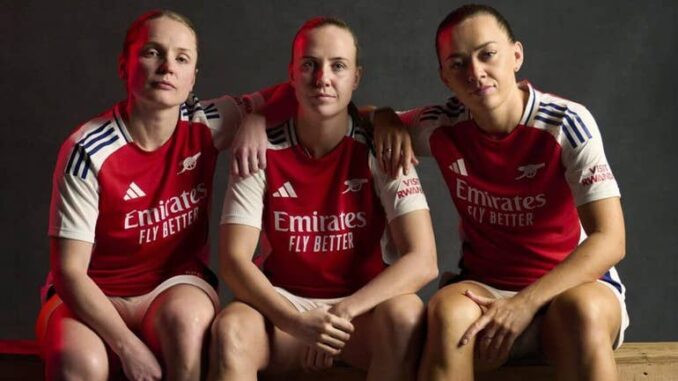
In recent years, the conversation surrounding women’s sports has shifted dramatically, but one of the most groundbreaking developments has been how Arsenal and Manchester City women’s football clubs have actively reclaimed the narrative on periods—a topic historically shrouded in stigma and silence. Through innovative campaigns, community engagement, and unwavering advocacy, these clubs are challenging long-held taboos, fostering a culture of openness, empowerment, and education.
**Breaking the Silence: The Cultural Context
Historically, discussions about menstruation have been considered taboo, often silenced by societal discomfort and misinformation. Female athletes, especially in professional sports, have faced stigma about their periods, with some experiencing shame or fear of judgment. This silence has contributed to misconceptions, affecting not only individual athletes’ confidence but also the broader perception of women’s health in sports. Recognizing this, both Arsenal and Manchester City have embarked on initiatives aimed at normalizing conversations about periods, emphasizing that menstruation is a natural and integral part of women’s lives—especially for female athletes whose performance can be influenced by their cycle.
**Arsenal’s Trailblazing Campaigns**
Arsenal Women’s Football Club has been at the forefront of this movement. In 2021, they launched a campaign titled “Periods Are Power,” which aimed to destigmatize menstruation within sports and beyond. The club collaborated with health organizations and menstrual product brands to provide educational resources, free period products at matches, and workshops for players, staff, and fans. The campaign featured powerful stories from players sharing their experiences, breaking down the shame associated with periods.
One of the campaign’s highlights was a series of short documentaries where players like Beth Mead and Vivianne Miedema openly discussed how managing their cycles impacted their training and performance. These candid conversations helped normalize discussions about menstruation, encouraging young girls and women to view it as a natural part of athletic life rather than a hindrance.
**Manchester City’s Community Engagement and Education**
Manchester City Women’s Club took a slightly different but equally impactful approach. Recognizing that the stigma extends beyond the pitch into communities, they launched the “Women’s Wellness Initiative” in collaboration with local schools and community centers. This initiative included interactive workshops, storytelling sessions, and the distribution of free menstrual health kits, aimed at breaking down taboos among young girls and boys alike.
Moreover, Manchester City’s players became ambassadors for menstrual health, sharing personal stories on social media and participating in campaigns aimed at dispelling myths. Their involvement aimed to foster a culture of openness from a young age, encouraging children to speak freely about their bodies and health without fear of shame or ridicule.
**Changing the Narrative in Media and Society**
Both clubs have also leveraged their influence to challenge media narratives that often marginalize women’s sports or portray female athletes as fragile or less capable during their periods. By highlighting stories of resilience and strength, Arsenal and Manchester City are redefining what it means to be a female athlete. Their campaigns emphasize that menstruation does not diminish athletic ability; instead, it’s a part of the human experience that can inspire and empower.
Additionally, these clubs have pushed for greater inclusion of menstrual health education in sports curricula and policy. They advocate for equitable access to menstrual products in sports facilities and schools, ensuring that no female athlete is forced to compete or train under conditions of discomfort or shame.
**Impact and Future Directions**
The efforts of Arsenal and Manchester City are already making tangible differences. Increased awareness, reduced stigma, and more open conversations are evident both on and off the pitch. Young athletes now feel more comfortable discussing their health, and fans have become more receptive to these important conversations.
Looking ahead, these clubs aim to expand their initiatives globally, partnering with international organizations to promote menstrual health in women’s sports worldwide. Their leadership demonstrates how sports organizations can serve as catalysts for societal change, championing issues that affect millions of women and girls.
**In Summary**
Arsenal and Manchester City women’s football clubs have successfully reclaimed the narrative on periods by integrating education, advocacy, and community engagement into their core missions. Their work not only empowers female athletes but also challenges societal taboos, fostering a more inclusive and understanding environment. As they continue to lead by example, they inspire a new generation to embrace their bodies, break down barriers, and celebrate menstruation as a symbol of strength rather than shame. Through their pioneering efforts, they are rewriting the story of women’s health in sports—one that is open, honest, and empowering.
Leave a Reply